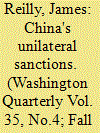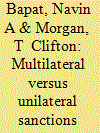| Srl | Item |
| 1 |
ID:
116619


|
|
|
|
|
| Publication |
2012.
|
| Summary/Abstract |
China's opposition to economic sanctions is legendary. Beijing has repeatedly leveraged its permanent seat in the UN Security Council to criticize, ameliorate, and on rare occasions veto UN economic sanctions such as against Myanmar (2007), Zimbabwe (2008), and Syria (2011 and 2012). Unilateral sanctions by the United States come in for particular criticism. Chinese Foreign Ministry spokesperson Hong Lei recently said that "China is against one country putting their domestic laws above international law and placing unilateral sanctions on another country."1 This familiar rhetoric, however, masks a subtle but significant shift in China's own use of economic sanctions. With the world's largest capital surplus and its second largest economy, a highly coveted domestic market, and a currency with growing regional appeal, Chinese strategists are exploring new ways to deploy China's own economic might for strategic benefit.
|
|
|
|
|
|
|
|
|
|
|
|
|
|
|
|
| 2 |
ID:
092342


|
|
|
|
|
| Publication |
2009.
|
| Summary/Abstract |
Policymakers frequently argue that multilateral sanctions are more likely to induce a target state to alter its behavior than are unilateral sanctions. Repeated empirical studies using the familiar Hufbauer, Schott, and Elliot data set demonstrate that unilateral sanctions "work" more often than multilateral sanctions, however. In this study, we subject three theoretical explanations for this counterintuitive finding to additional empirical testing utilizing the new Threat and Imposition of Economic Sanctions (TIES) data. Somewhat surprisingly, the analyses using these new data support the intuition of policymakers; that is, multilateral sanctions do appear to work more frequently than do unilateral sanctions. Our results do support one theoretical argument, based on spatial models, that we test. This explanation holds that whether multilateral or unilateral sanctions are more effective depends on the number of issues at stake and on whether an international institution is involved. Our analyses provide support for these hypotheses.
|
|
|
|
|
|
|
|
|
|
|
|
|
|
|
|
| 3 |
ID:
117386


|
|
|
|
|
| Publication |
2012.
|
| Summary/Abstract |
WE PRESENT HERE a summary of the discussion on unilateral sanctions at the International Law Council at the Ministry of Foreign Affairs of the Russian Federation.
This is becoming particularly relevant today, as the United States, the European Union, and a number of other countries have imposed such sanctions on Belarus, Syria, and Iran. And the examples of unilateral actions that raise questions in the international community, especially when those actions are given extraterritorial effect, are not limited to just them.
|
|
|
|
|
|
|
|
|
|
|
|
|
|
|
|